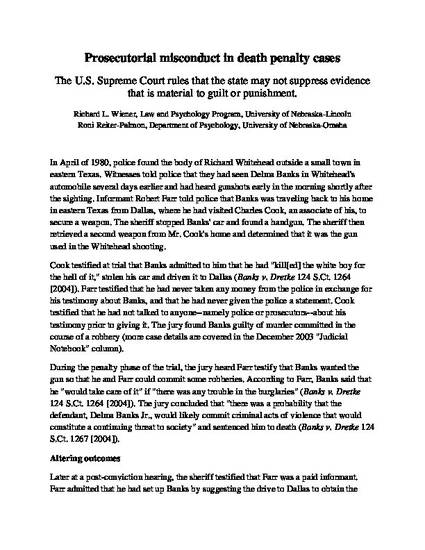
Article
Prosecutorial misconduct in death penalty cases: The U.S. Supreme Court rules that the state may not suppress evidence that is material to guilt or punishment
Monitor on Psychology
Document Type
Article
Publication Date
6-1-2004
Disciplines
Abstract
n April of 1980, police found the body of Richard Whitehead outside a small town in eastern Texas. Witnesses told police that they had seen Delma Banks in Whitehead's automobile several days earlier and had heard gunshots early in the morning shortly after the sighting. Informant Robert Farr told police that Banks was traveling back to his home in eastern Texas from Dallas, where he had visited Charles Cook, an associate of his, to secure a weapon. The sheriff stopped Banks' car and found a handgun. The sheriff then retrieved a second weapon from Mr. Cook's home and determined that it was the gun used in the Whitehead shooting.
Citation Information
Richard L. Wiener and Roni Reiter-Palmon. "Prosecutorial misconduct in death penalty cases: The U.S. Supreme Court rules that the state may not suppress evidence that is material to guilt or punishment" Monitor on Psychology Vol. 35 Iss. 6 (2004) p. 87 - 87 Available at: http://works.bepress.com/roni_reiter-palmon/33/

© 2004 by the American Psychological Association.
This article may not exactly replicate the final version published in the APA journal. It is not the copy of record. The final version can be found at http://www.apa.org/monitor/jun04/jn.aspx.